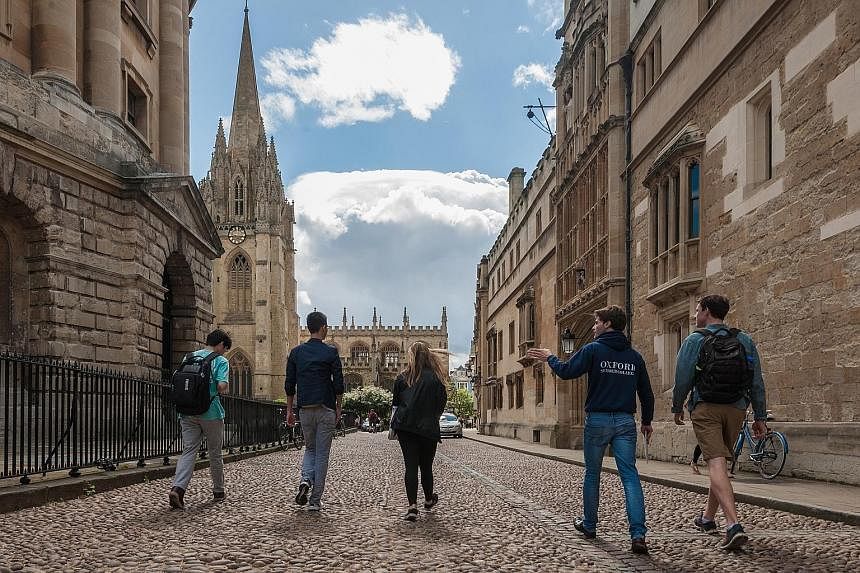More students in Singapore are looking for a glimpse of college life overseas via summer camps and online undergraduate-level courses.
Top American universities - among them Stanford, Johns Hopkins and Yale - offer online and offline courses for pre-university students. Most of these programmes, which typically cost more than $5,000 for summer camps and more than $400 for online courses, are targeted at high-ability students and require them to take a test to qualify.
Commercial groups such as Reach Cambridge and Oxford Summer College in Britain - not affiliated to the two famous universities - also rent spaces at universities to run academic camps.
Attendance of such camps and online courses are not a guarantee for admission to the university.
Students who went for these stints said they wanted to experience life overseas. Those who took up courses online were looking for more challenging content.
-
SUMMER CAMPS
-
STANFORD INTERNATIONAL YOUTH PROGRAMME
- A two-week stint in August for students aged between 14 and 17. It started in 2012 as a division of Stanford Pre-Collegiate Studies, which provides programmes for high school and middle school students.
- The US$4,700 (S$6,300) course consists of lectures and workshops at Stanford's campus in California and field trips to Silicon Valley.
YALE YOUNG GLOBAL SCHOLARS PROGRAMME
- A two-week course on the Yale campus for students to learn about global issues, in fields from politics and innovation to economics and international security. It includes lectures from Yale faculty, small-group meetings and discussion seminars.
- The courses, which run from June to August this year, each costs US$5,250.
REACH CAMBRIDGE
- It runs two- or three-week courses in July and August at Cambridge in Britain. It also customises programmes for schools.
OXFORD SUMMER COLLEGE
- It conducts a two-week university preparation programme in July at Pembroke College, Oxford University, in Britain.
- Students can study subjects such as law and medicine, and get guidance from tutors on the university admissions process.
JOHNS HOPKINS CENTRE FOR TALENTED YOUTH
- Part of Johns Hopkins University, the non-profit centre runs summer programmes from June to August at college sites in the US and Hong Kong.
- These include one- to three-week courses in areas such as writing and engineering. A three-week camp costs US$4,190.
- The centre also conducts online courses for academically advanced students. These cost from US$500 to US$1,300.
AMELIA TENG
In the last two years, 80 students from Hwa Chong Institution (HCI) and Raffles Institution (RI) attended two-week stints at Stanford University in California. This is up from 20 students in 2012 from HCI only.
The course, known as the Stanford International Youth Programme, covers subjects such as science, business, medicine and humanities. Students work in small groups on projects and visit Stanford's laboratories and facilities. They also visit museums, and Silicon Valley companies and sites.
Meanwhile, students also enrol in online courses developed by Stanford on topics such as language, arts and physics.
This year, more than 60 students from Singapore are taking these online courses, up from 15 in each of the last two years. They get a certificate after completing each course, which comprises guided exercises, videos, games and exams.
A spokesman for Gifted and Talented, a division of Redbird Advanced Learning, which owns the licence to run the courses, said it is adjusting its customer support and tutoring hours to suit Singapore and Hong Kong's time zones, in response to more interest from Asia.
Likewise, Oxford Summer College is looking to launch a university preparation course online in December next year for students who are unable to attend its summer courses because they clash with their school term here.
The Johns Hopkins Centre for Talented Youth (CTY) has more Singapore students qualifying for its online and offline pre-college courses, from 15 in 2006 to 96 last year.
Its online courses had 84 signups from Singapore last year, up from 78 in 2012. In 2006, it had only five signups from here. A person can enrol in several courses at the same time. The centre's summer camps have also drawn interest, with 39 Singapore students planning to attend this year. In the last three years, 40 to 50 students from here joined its summer camps a year.
Madam Jackie Ang, 53, a housewife, said her son, now in Secondary 1, started taking CTY's online courses in Primary 4 to learn Web programming and coding. "We were looking for something extra that the school would not cover."
Mrs Sylvia Kong's son, now 12, took up courses in language and writing when he was eight. Said the 43-year-old housewife: "It's like going to school online; you can go as fast or slow as you want. But there's a time difference between the US and Singapore, so we couldn't make full use of the tutors."
High-ability students who cannot afford these courses can apply for financial aid from the universities. There are also scholarships.
In 2013, six Singaporean students attended the CTY summer course, fully funded by the Goldstein Scholarship. Last year, eight received the same scholarship, set up in 2012 by Singapore-based American businessman Harvey Goldstein and his wife Rosita.
A Singaporean student who benefited from the scholarship was Liu Hongzhan, 17, who took a zoology course two years ago that would have cost her more than $5,000.
"It opened my eyes to a different culture and education system," said the RI student whose three-week course was held at Haverford College, a liberal arts college in Pennsylvania. She visited vet clinics, the Philadelphia zoo and learnt to dissect animals such as a small shark, a frog and a rat.
"I realised that I'm comfortable with living away from home... It also trained me to interact with people from different cultures," said Hongzhan, who hopes to pursue a science-related degree in future.


